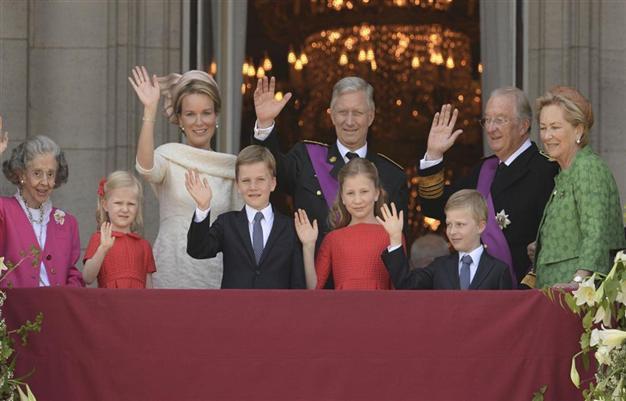Philippe ascends throne of divided Belgium
BRUSSELS - Agence France-Presse

From right, Belgium's Queen Paola, King Albert II, Prince Emmanuel, Princess Elisabeth, King Philippe, Prince Gabriel, Queen Mathilde, Princess Eleonore and Queen Fabiola wave to the crowd as they stand on the balcony of the royal palace in Brussels on Sunday, July 21, 2013. Philippe has taken the oath before parliament to become Belgium's seventh king after his father Albert II abdicated as the head of this fractured nation. Earlier Sunday, the 79-year-old Albert signed away his rights as the k
Philippe ascended the throne of Belgium as its seventh king on Sunday amid National Day celebrations marked by hopes the fragile nation can remain united.
"I swear to abide by the constitution and the laws of the Belgian people," Philippe, 53, and dressed in full military uniform, said in the country's three languages -- French, Flemish and German.
"I am aware of the responsibilities weighing on my shoulders," he added, after the abdication of his father Albert II after 20 years at the helm of the linguistically-split country at the heart of Europe.
Albert, 79, abdicated in favour of his eldest son at a solemn ceremony in the royal palace's chandelier-laden throne room after saying he felt too old and too fragile to continue to reign.
In his last speech, Albert reiterated a call to the country's leaders "to work tirelessly in favour of Belgium's cohesion".
His voice breaking with emotion, Albert turned to his wife of 54 years, Queen Paola, to say: "As for the queen who constantly supported me in my task I would simply like to tell her 'thank you.' "A big kiss", he added as she shed a tear and the audience of political leaders and other dignitaries broke into a long round of applause.
Under sunny skies and a light summer breeze, flags fluttered across Brussels as the day of pageantry began with a thanksgiving mass in the cathedral and crowds lined outside shouted "Long Live the King".
The medieval cathedral of Saint Michael and Gudula was packed with Belgian government and other dignitaries, but there were no foreign guests in attendance.
"It is a new page for the monarchy," said Maximilien De Wouters, a student of 24 draped in the black, yellow and red national flag.
But worries persist that the shy and often awkward prince Philippe may lack the political skills of his father to maintain unity in a nation deeply divided between its Flemish- and French-speaking halves.
Mathilde, an outgoing 40-year-old who will be Belgium's first home-grown queen, is seen as his best asset in the couple's campaign to win the hearts of their 11.5 million people.
"Philippe, you have the heart and the intelligence to serve our country very well," Albert said in his abdication speech. "You and your dear wife Mathilde have all our confidence." The monarchy more often than not is viewed as a rare symbol of Belgium's unity -- along with its iconic fries and the national football team.
But while the French-speakers of the south remain largely royalist, Flemish-speaking Flanders, home to 60 percent of the population, has cooled. There, the powerful separatist N-VA party favours a republic, or at least a royal as figurehead only.
"I am a fan of the royal family," said Cindy van Merheulen, 34, from Limburg in Flanders. "I want to welcome Philippe. Nearly all Belgians love the king, the problem is that those who are against shout louder." In the last decades, severe tensions across the linguistic divide in a country that hosts key international institutions such as the EU and NATO, have seen it morph progressively into a federal state that devolves increasing powers to its language-based regions.
During his two decades at the helm, Albert II helped steer the country through several crises and avoid break-up.
He played a key role to end its longest political crisis in 2010-2011 when the country went through a record-breaking 541 days without a government.
In a farewell speech to the nation Saturday, he said his first wish as he stepped down was to see Belgium "retain its cohesion".
"I am convinced that maintaining the cohesion of our Federal state is vital, not only for our quality of life together, which requires dialogue, but also so as to preserve the well-being of all," he said.
Many fear that the separatist N-VA, the strongest party in Flanders, will make further gains in next May's general election.
With the country mindful of the need to tighten government spending due to Europe's economic crisis, Sunday's celebrations that take place on its National Day will be kept to around 600,000 euros ($788,000), on a par with the annual July 21 event.
